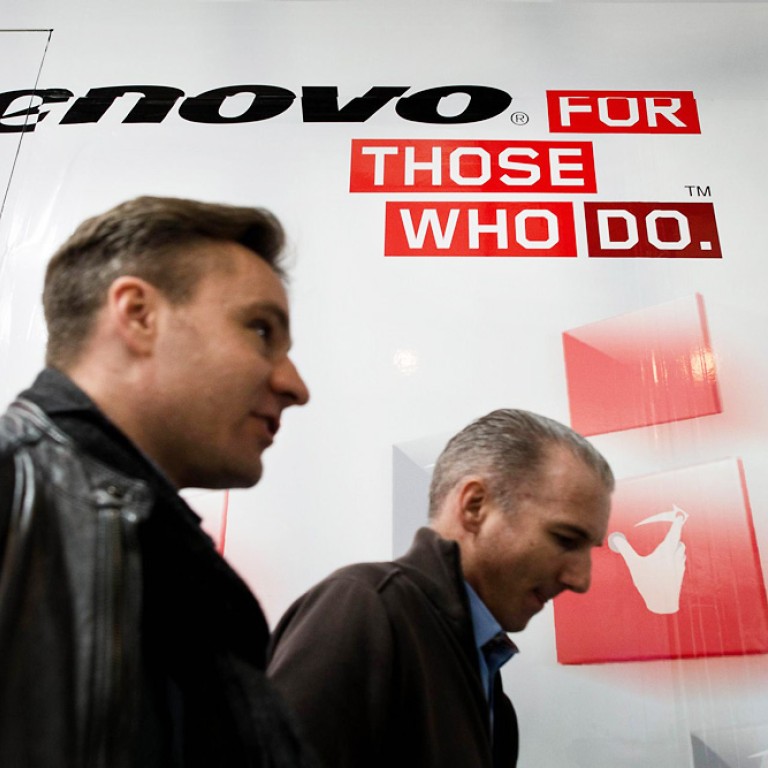
Lenovo's mobile push to hit Taiwanese rivals
Taiwanese makers' global smartphone ambitions will be weakened by the mainland giant's purchase of Motorola's mobile unit, analysts say
Lenovo's purchase of the Motorola mobile unit will hobble two giant rivals from world hi-tech hardware hub Taiwan, further frustrating three years of efforts to generate world smartphone market share considered key to their long-term survival.
Acer and Asustek Computer will find it increasingly tough to vie with Lenovo as the Motorola deal reached in January gives Lenovo unique US market access and a wealth of mobile device patents, industry analysts say.
"The Taiwanese smartphone-tablet vendors, like Acer and Asus, have long struggled to make headway in global mobile markets," said Neil Mawston, a wireless device executive director with Strategy Analytics in Britain.
"The Lenovo-Motorola deal emphasises just how big the Chinese brands are becoming and how far behind the Taiwanese vendors are lagging today."
Lenovo bought Motorola Mobility for US$2.9 billion from Google, giving it a 6 per cent world market share, behind only Samsung and Apple. Once the deal gets regulatory approval, the mainland computer maker can use Motorola's extensive mobile-phone patents to make its own devices.
A bigger Lenovo will stunt Taiwanese computer makers by piggybacking on Motorola's long-term popularity in the US market, building on its own brand in China with Motorola patents and leading a smartphone price drop in the mainland market, analysts say. Acer and Asustek have no similar tie-ups with handset makers.
Over the past three years, Taiwanese builders of personal computers or motherboards have tried new products and unique marketing to gain world smartphone market share, which research firm Gartner says grew an estimated 3.7 per cent last year while sales fell 6.9 per cent.
Those efforts dovetail with a broader effort among Taiwanese technology firms to stay competitive through self-branded products as their old staple, contract work, finds cheaper bases offshore.
But while Lenovo is a top brand on the mainland, its Taiwanese rivals lack a comparably large consumer base. Taiwanese know the brands, but they make up a market of just 23 million people. That means few major telecommunications carriers will distribute their smartphones, analysts say.
"Acer and Asus don't have a unique corner of the market," said Wilson Miao, an analyst with market research firm TrendForce. "The Lenovo-Motorola deal will put more pressure on Acer and Asustek. Companies that don't do that many smartphones will be leaving. Their production scale will lose money and lose a lot."
A boom in middle-end Lenovo handsets would push prices down for all brands sold on the mainland, which was likely to slice away at already thin smartphone margins, said Vincent Chen, an analyst with Yuanta Securities.
Spokesmen for Acer and Asustek said Lenovo's move on Motorola would not affect business plans. "There are a lot of players in smartphones and they're just one," an Acer spokesman said, referring to Lenovo. "We're doing our own thing."
Neither Acer nor Asustek lists smartphones on breakdowns of revenue per product, but a category Acer calls "others" rose two percentage points to 9 per cent last year. Asustek's "others" category also rose, to 10 per cent from 9. Asustek reported a fourth-quarter profit, while Acer posted a 5 per cent loss in the final three months of last year, continuing a downward trend since 2011.
Asustek, the world's fifth-ranked personal computer vendor, has indicated it will keep looking to notebook computers for revenue, although its newest mobile devices, like a phone-tablet hybrid, have reached shelves in parts of Asia this year.
Acer's Liquid Z5 smartphone entered markets in Latin America and Southeast Asia in January. The company, still ranked as the No4 personal computer maker, launched a marketing campaign in November last year to highlight its mobile devices.
Emerging markets should shape up as a trend for Taiwanese smartphones, says Market Intelligence & Consulting Institute, a Taiwan government-backed research group. Local firms might also consider Motorola's move of joining forces with emerging-market rivals, it says.
"Instead of striving to become a global player, Acer and Asus are more concerned about regional markets," it said. "What they can learn from the Lenovo-Motorola case is that acquiring local brands in emerging markets can be a short cut to boost their market share. However, whether they will actually adopt this strategy remains to be seen."

